This section contains information on the agency's planned results and resources for each of its core responsibilities. It also contains information on key risks related to achieving those results.
Statistical information
Description
Statistics Canada produces objective, high-quality statistical information for the whole of Canada. The statistical information produced relates to the commercial, industrial, financial, social, economic, environmental and general activities and conditions of the people of Canada.
Planning highlights
The agency is seeing positive outcomes and results of its modernization investments in being able to better serve Canadians and decision makers. These modernization efforts have positioned Statistics Canada to build on its strengths, to embed continuous improvement and innovation into its culture, to be a resourceful and resilient organization built on solid values. With the ongoing modernization journey in a post-pandemic context, the agency is focusing its attention to the following four areas to achieve its planned results and ensure the continued success of its core principles:
- Partnerships: The agency will continue to build synergistic partnerships with organizations to ensure value for both parties in the areas of data collection and usage, and to increase the relevance of products, services and insights. The agency will also strengthen partnerships between and across sectors with all orders of government and with academia. It will expand its engagement with key partners, such as the Canadian Chamber of Commerce, the Federation of Canadian Municipalities, Indigenous organizations, and the provinces and territories.
- Trust and transparency: The linchpin of Statistics Canada's work is Canadians' trust in the agency, in a context where data sources and information needs are constantly evolving and expanding. The agency will continue to keep Canadians' data safe and will be as transparent as possible to strengthen the trust of those it serves as it meets these pressing demands.
- Integration: As data are one of the world's most precious resources, Statistics Canada's work aims to be more and more integrated. The agency will continue to be a leader by contributing its expertise to better integrate data from various sources and extract valuable insight. The integration of social, economic and environmental data will help shed light and inform policy makers on the challenges that the country faces after the pandemic.
- Data services: The agency is playing a leadership role as a responsible data steward in all steps of the data value chain, from acquiring data to processing, integrating, analyzing and sharing them with Canadians, by using modern methods and tools to deliver actionable insights that make a real difference in the lives of Canadians.
These four areas of focus were developed in collaboration with stakeholders and data users to better understand their information needs and revolve around the agency's five core modernization principles.
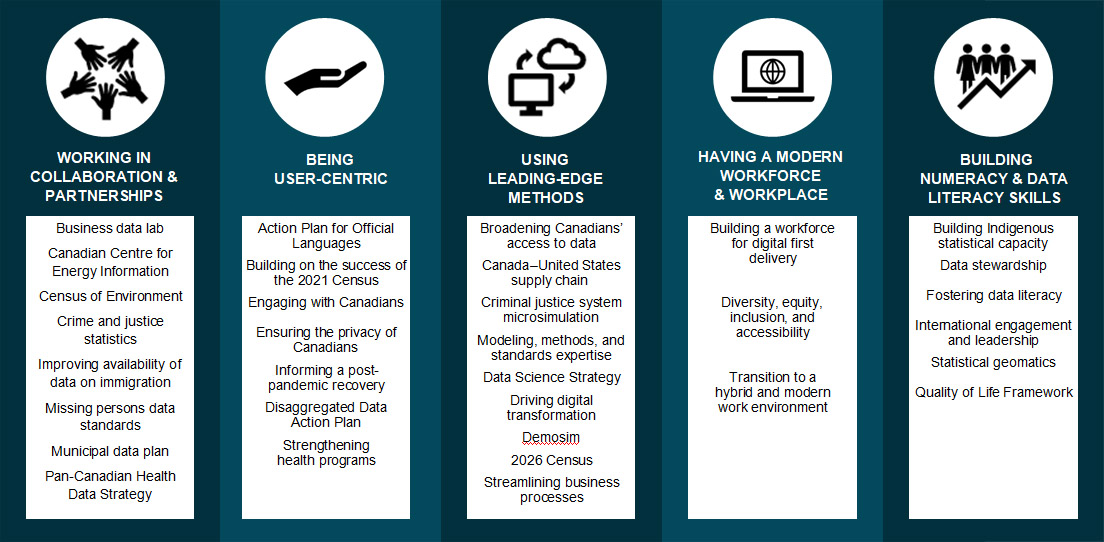
Description - Statistics Canada's five core modernization principles
Working in collaborations and partnerships
- Business data lab
- Canadian Centre for Energy Information
- Census of Environment
- Crime and justice statistics
- Improving availability of data on immigration
- Missing persons data standards
- Municipal data plan
- Pan-Canadian Health Data Strategy
Being user-centric
- Action Plan for Official Languages
- Building on the success of the 2021 Census
- Engaging with Canadians
- Ensuring the privacy of Canadians
- Informing a post-pandemic recovery
- Disaggregated Data Action Plan
- Strengthening health programs
Using leading-edge methods
- Broadening Canadians' access to data
- Canada–United States supply chain
- Criminal justice system microsimulation
- Modeling, methods, and standards expertise
- Data Science Strategy
- Driving digital transformation
- Demosim
- 2026 Census
- Streamlining business processes
Having modern workforce and workplace
- Building a workforce for digital first delivery
- Diversity, equity, inclusion, and accessibility
- Transition to a hybrid and modern work environment
Building numeracy and data literacy skills
- Building Indigenous statistical capacity
- Data stewardship
- Fostering data literacy
- International engagement and leadership
- Statistical geomatics
- Quality of Life Framework
Strengthening the statistical system
Canadians entrust their information and data to Statistics Canada, and the agency has built a world-leading framework to protect and handle data safely without compromising confidentiality or the trust of Canadians.
The Social Data Integration Platform (SDIP) is a tool for collecting social surveys that allows for the integration of administrative data, as well as the direct collection of data from respondents. Statistics Canada will continue the expansion and development of collection options to support direct collection and data integration through the SDIP, replacing some variables and making greater use of administrative data.
The Secure Infrastructure for Data Integration (SIDI) is a set of methods, technologies and protocols that will enhance the way Statistics Canada combines its existing data with data from other organizations. In 2023–24, the agency will continue to develop the SIDI, which connects directly to the existing frameworks of the Longitudinal Social Data Development Program and Social Data Linkage Environment. This platform will enable secure data linkages while aligning with strong privacy principles and bringing value to Canadians.
The agency balances rigorous internal governance with external advice from groups such as the Canadian Statistics Advisory Council (CSAC), which provides recommendations that reinforce the independence, relevance and quality of the national statistical system.
The council released its third annual report in 2022, Trust, Governance and Data Flows in the National Statistical System. It builds on the first two reports and focuses on the need for new types of partnerships and data coordination to support Canadians and leaders as the country recovers from the pandemic and deals with socioeconomic and global environmental challenges.
The report provides three main recommendations to the Minister of Innovation, Science and Industry and the Chief Statistician: maintaining the authority and responsibilities of Statistics Canada by ensuring that they are not diminished or compromised by privacy or other legislation related to data and digital infrastructure; strengthening data stewardship within the national statistical system to ensure that Canada has the data it needs to successfully tackle social, economic and environmental challenges in a digital world; and strengthening data sharing across jurisdictions to address data needs in Canada, including provincial, territorial and regional data flows. Statistics Canada continues to make good use of CSAC's expert advice on an ongoing basis and is ensuring that the work planned for the upcoming year aligns with key recommendations.
Modernization principle: Working in collaboration and partnerships
To better respond to the evolving information needs of Canadians and to remain relevant, Statistics Canada will continue working in collaboration with federal departments; provincial and territorial governments; international partners; and other organizations, such as businesses and non-governmental organizations. This post-pandemic engagement will build on dialogue with national Indigenous organizations—based on the recognition of rights, respect, collaboration and partnership—to better understand their information needs, and with equity-deserving groups and organizations to further identify their data needs as the Canadian population continues to evolve.
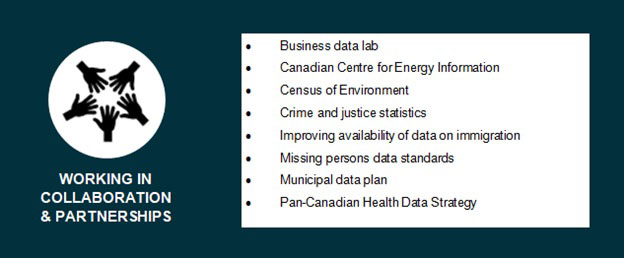
Description - Modernization principle: Working in collaboration and partnerships
Working in collaborations and partnerships
- Business data lab
- Canadian Centre for Energy Information
- Census of Environment
- Crime and justice statistics
- Improving availability of data on immigration
- Missing persons data standards
- Municipal data plan
- Pan-Canadian Health Data Strategy
The following partnerships contribute to supporting and measuring progress and outcomes for key government priorities.
Business data lab
Statistics Canada's partnership with the Canadian Chamber of Commerce sparked the creation of a business data lab that will bring together business data from multiple sources and support the development of a hub on business trends during the pandemic recovery. This type of collaboration, which includes the intake, manipulation and visualization of data in real time, enables the production of more timely and policy-relevant information that can be used to make government and business decisions. In addition to the recently created dashboard on workplace mobility, additional dashboards will be created to shed light on the recovery of Canada's business sector.
Canadian Centre for Energy Information

The Canadian Centre for Energy Information (CCEI) provides value to Canadians regarding energy information by integrating federal data and facilitating data sharing across federal departments. This collaborative work improves the accessibility, interpretability and quality of energy information for all, while bringing a rich set of tools and resources to one convenient place. Statistics Canada, along with the partner departments, will continue to build on the CCEI to meet the demand for new energy information, data coherence and reconciliation. A key area for future work will be to share and integrate data across all levels of government, as well as academia and the private sector. This includes broader consultation and engagement with stakeholders and data users, such as the research and modelling communities.
Census of Environment

The Census of Environment aims to provide foundational data on Canada's ecosystems to help monitor environmental trends. It will enable evidence-based decision making on issues affecting the well-being of all Canadians. In 2023–24, the agency will continue to develop key ecosystem products based on an internationally accepted ecosystem accounting standard so outside researchers can use these data for their own work. Collaboration with key partners, such as other federal departments and Indigenous organizations, will be crucial to the success of this program to incorporate scientific information and ensure data needs are addressed. This investment will deliver accessible, detailed time-series data products on ecosystem assets. Policy departments, academics and the general public will be able to use these to answer questions on key issues, such as climate change and mitigation. Statistics Canada will also develop and maintain partnerships with public and private (e.g., non-governmental) organizations to position itself as a key source of ecosystem data. These partnerships will bring data, methods and opportunities for collaboration. Finally, the agency will contribute to the development of critical international statistical frameworks related to ecosystem accounting to better measure and report comparable data and use common methods.
Crime and justice statistics
Through collaboration with Public Safety Canada, the Pan-Canadian Recontact Project will examine subsequent convictions among adults sentenced to a term of correctional supervision, including key demographic, socioeconomic and systemic factors associated with subsequent convictions. This initiative will help monitor the effects of policies and programs designed to reduce the likelihood of subsequent convictions. Furthermore, the agency will work with Public Safety Canada and the Canadian Association of Chiefs of Police to expand firearm data collection to further inform firearm policies and monitor the impact of efforts to reduce the number of illegal firearms.
The agency will also collaborate with the Department of Justice Canada to examine racial disparities in criminal court outcomes, specifically between Indigenous and non-racialized accused people. This will include socioeconomic and systemic factors that may account for disproportionate outcomes. This analysis will help shed further light on criminal justice system biases experienced by Indigenous people.
Improving the availability of data on immigration
Non-permanent residents (NPRs) are people who have been legally granted the right to live in Canada on a temporary basis under the authority of a temporary resident permit, along with family members who live with them. NPRs have become a critical component of population growth in the country because of an increase in the last few years to address labour shortages. This is why Statistics Canada is working with Immigration, Refugees and Citizenship Canada to release new estimates on NPRs from the Demographic Estimates Program, improving the availability of data on permanent and temporary immigration.
Missing persons data standards
Statistics Canada will work with the Canadian Association of Chiefs of Police, Crown-Indigenous Relations and Northern Affairs Canada, and non-governmental organizations to develop consistent mechanisms for reporting missing persons (including Indigenous women, girls, 2SLGBTQI+ people, racialized populations and other groups). The goals are to help improve investigations of missing persons cases and support further research and analysis on this issue.
Municipal data plan
Statistics Canada will advance its work with the Federation of Canadian Municipalities and other key municipal stakeholders and ensure that the data and information collected reach the key targets, such as municipalities and associations. The agency is developing an integrated municipal data portal and collaboration platform and a municipal finance and socioeconomic dashboard to make disaggregated information at municipal and local levels more user friendly and accessible. A targeted communications and engagement plan aimed at facilitating a collaborative environment with other producers, users and integrators of municipal data is also being developed. These projects constitute the foundation for a municipal data strategy that aligns with the Disaggregated Data Action Plan and the rural and northern data strategies.
Pan-Canadian Health Data Strategy
To address the data needs of Canadians and provide a long-term vision for better health care data management, the federal, provincial and territorial governments developed the Pan-Canadian Health Data Strategy (PCHDS). This strategy aims to provide a data foundation that enables better health outcomes and public health responses for individuals, communities and Canadian society through learning health systems.
As a key partner in the development of the PCHDS, the agency will play a central role in implementing it; contributing to the PCHDS's governance structure; developing, promoting and maintaining data content standards in the area of population health; creating platforms for timelier, easier and more comprehensive data access; and filling critical information gaps.
Modernization principle: Being user-centric
The agency will prioritize its users and partners at every step in the data value chain, with the aim of making it simple for Canadians to connect with their data.
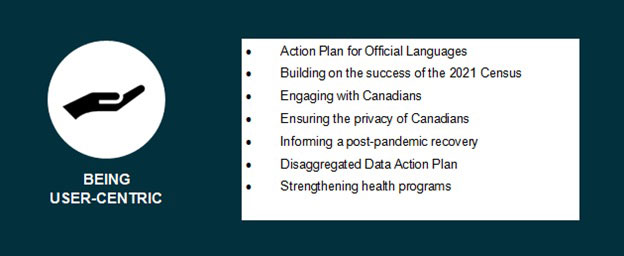
Description - Modernization principle: Being user-centric
Being user-centric
- Action Plan for Official Languages
- Building on the success of the 2021 Census
- Engaging with Canadians
- Ensuring the privacy of Canadians
- Informing a post-pandemic recovery
- Disaggregated Data Action Plan
- Strengthening health programs
Action Plan for Official Languages
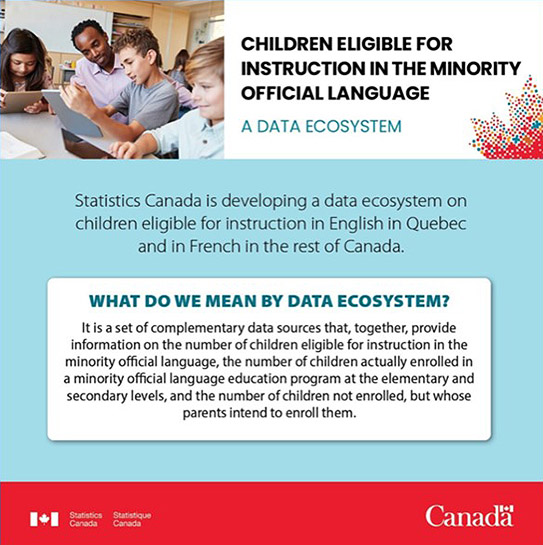
Description - Children eligible for instruction in the minority official language
Children eligible for instruction in the minority official language: A data ecosystem
Statistics Canada is developing a data ecosystem on children eligible for instruction in English in Quebec and French in the rest of Canada.
What do we mean by a data ecosystem?
It is a set of complementary data sources that, together, provide information on the number of children eligible for instruction in the minority official language, the number of children actually enrolled in a minority official language education program at the elementary and secondary levels, and the number of children not enrolled but whose parents intend to enrol them.
Statistics Canada will implement the 2023–2028 Action Plan for Official Languages, which supports linguistic communities throughout the country, notably through new data on children eligible for instruction in the minority official language and new population projections on linguistic groups. The agency will also continue activities related to the postcensal survey on official languages to improve knowledge on critical issues faced by linguistic communities in Canada.
Building on the success of the 2021 Census

Following a successful census, the release of 2021 Census information will continue in 2023–24, with a focus on more detailed, targeted and granular data. This includes dissemination of
- additional immigration and ethnocultural data from the 2021 Census (data products and indicators)
- additional analytic results (e.g., financial impacts of COVID-19 on racialized groups and non-permanent residents)
- the postcensal Canadian Survey on Disability in December 2023—this information will be used to plan, deliver and evaluate services, programs and policies for Canadians with disabilities to strengthen their full participation in society.
Engaging with Canadians
To ensure that insights are easily understood and reach more Canadians, the agency will
- provide timely information in an accessible format by continuing to develop dashboards on topics of interest for economic development, such as traffic flow, real-time local business indicators, infrastructure and supply chain analysis
- launch a consultation program with potential providers of administrative data and expertise for its housing program (New Housing Price Index, New Condominium Apartment Price Index); new housing associations and major builders will be contacted to ensure that the program is relevant and to explore opportunities to work together
- continue developing the Consumer Price Index (CPI) portal, data visualizations and web-based information that are accessible to all Canadians; in 2023–24, the CPI will continue to enhance the set of CPI tools and resources to engage with Canadians—plans include webinars, podcasts, Reddit Ask Me Anything events, technical briefings and enhancements to existing tools
- help users easily analyze rich information on the macroeconomic accounts with a number of new data visualization tools that have been created for gross domestic product, satellite accounts and many subcomponents; these tools will continue to evolve and improve.
Statistics Canada launched Phase I of the text-to-speech (TTS) pilot project on selected pages of its website. TTS is an assistive technology on the rise that provides users with another way to consume content published online by making it audible. A phased approach is being used to implement this technology, to ensure that it is relevant and user friendly for all Canadians, particularly readers with low literacy and those with visual disabilities, dyslexia and other learning disabilities. Phase I of this pilot project will implement two different features of TTS technologies and collect feedback on user expectations, tool functionalities and suggestions for improvements.
Statistics Canada continues to work toward its vision to be more client centric and improve outcomes for Canadians. The agency's new Client Relationship Management program helps it take another step forward on its journey by
- placing the client experience at the front and centre of its business model
- prioritizing the client experience at all points of the customer journey
- helping provide seamless access to products and services through a more consistent, cross-functional and horizontal approach for Statistics Canada employees.
By leveraging the capabilities of the new program, the agency will be able to continuously and strategically adjust its service delivery to respond to the needs of Canadians.
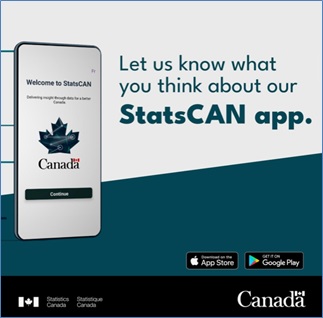
Statistics Canada will continue leveraging The Daily, the StatsCAN app, the Eh Sayers podcast, social media and data portals to ensure that statistical information reaches more Canadians and is accessible to a broader audience.
Statistics Canada's publishing strategy will ensure that Canadians are getting the data they need through new communications tools in a timely manner, and that communications products reach the agency's many target audiences and provide information in the format users want. Key components of the strategy include reaching audiences in a timelier fashion and increasing the agency's reach as a whole; adjusting the storytelling narrative to be shorter and more user-friendly; focusing on visuals, graphics and visually pleasing layouts to engage with readers; and creating data stories that connect with more Canadians and invite them to explore more of the agency's products and data.
Ensuring the privacy of Canadians in an increasingly digital world
As part of Statistics Canada's commitment to demonstrating and providing assurances to Canadians that it can be trusted with their information, the agency is continually adjusting to new realities and adapting existing mechanisms, or developing new ones, to protect the privacy of Canadians and ensure that their data will not be misused. The agency will continue to foster a responsible approach to privacy and meet the demands of a digital world in the 21st century through the implementation of the Privacy Management Program (PMP). While many of its components are already part of the agency's activities, the PMP provides a systematic and strategic approach that reinforces Statistics Canada's commitment to Canadians regarding their personal information.
Through collaboration between internal and international experts, and with the Office of the Privacy Commissioner of Canada, Statistics Canada will strengthen and promote the updated Necessity and Proportionality Framework, and ensure communication and engagement with users through the redesigned Trust Centre. In particular, the agency will work to strengthen the data ethics function and develop related policy instruments and tools.
To enable the confidential compilation of data that reflect the lived experiences of a variety of demographic groups—such as Indigenous people, racialized Canadians, people in 2SLGBTQI+ communities and Canadians living with disabilities—a set of methods, technologies and protocols will enhance the way Statistics Canada combines its existing data with those from other organizations, while ensuring the confidentiality of records.
Statistics Canada will also build on the work done on the Trust Agenda while taking the pulse of Canadians. Collaboration will continue with departments and agencies to provide data and information that can inform policy and program options to help Canada move forward in a changing world.
Informing a post-pandemic recovery and critical structural changes
The CPI program will continue to monitor consumer prices for goods and services during the post-pandemic recovery period, as well as consumer spending patterns. Annual basket updates will be done as spending patterns continue to stabilize, while the impact of structural changes in specific sectors will be measured in terms of their effect on consumer prices.
The Canadian Survey on Business Conditions will continue to produce results on a quarterly basis and provide timely indicators of the business environment and the impacts of labour challenges, rising costs and supply chain pressures.
Statistics Canada will also continue to play a leading role in shedding light on government measures taken during the pandemic by providing a single source of comprehensive information on who accessed them (small and medium enterprises, industries) and to what extent. This analytical tool will help policy makers assess the impact of government measures and provide insights on the financial health of firms.
To inform post-pandemic recovery in the tourism sector, the agency will publish insights on car rentals resulting from pent-up household and business demand, on inflationary pressures, and on supply-chain disruption to rental car inventories. Similarly, a subprovincial analysis of traveller accommodation services industries, including short-term rentals, will shed light on post-pandemic shifts.
Data from the agency's social surveys, such as the Survey on Time Use and Survey on Family Transitions, will be used to support a number of indicator frameworks and provide analytical insights related to post-pandemic societal changes.
In response to the increasing demand for detailed economic data for regional and rural development, the agency will develop fine geographic estimates of business values (e.g., gross domestic product, gross domestic income, revenue, employment), as well as measures of business dynamics (e.g., entry, exit). This work will form a foundation for future studies on the growth of cities, urban and rural dynamics, and geographically sourced structural change. It will also improve the ability to link business estimates with other domains. Statistics Canada will continue to develop new products and complete studies to address user needs for emerging economic and environmental concerns.
Responding to the disaggregated data needs of Canadians

The Disaggregated Data Action Plan supports a broader movement of zero tolerance toward inequities and systemic biases and racism in all parts of society and institutions. It aims to provide Canadians with the detailed data they need to help address gender gaps, racism and other systemic barriers, as well as to apply fairness and inclusion to decisions that affect the entire population.
The agency will continue to support building a whole-of-government approach for the improved collection, analysis, availability and publication of disaggregated data in 2023–24. This includes collaborating with federal and external partners on methods to increase and accelerate data disaggregation; producing estimates for racialized populations; integrating the agency's business and special surveys with social surveys; increasing data linkages between existing administrative and survey data; and releasing the redesigned Gender, Diversity and Inclusion Statistics Hub.
This work includes providing more granular economic data on the Indigenous population by breaking down employment statistics, such as average wages and salaries, by sociodemographic characteristics.
Strengthening health programs
In 2023–24, Statistics Canada will strengthen its health programs by focusing on the following four areas:
- enhancing external engagement to improve national population health reporting and participate in meaningful health data collaborations
- expanding health data holdings to address the growing information needs of governments in their efforts to improve the health of Canadians
- strengthening data disaggregation to broaden and deepen the country's understanding of health inequities in Canada
- participating in the governance, development and implementation of the Pan-Canadian Health Data Strategy
Statistics Canada will continue to lead the development of the Health Care Access, Experiences and Related Outcomes initiative in the areas of supportive care, primary care, virtual care, pharmaceuticals, sexual and reproductive health, and mental health. Data on virtual care and electronic health information, as well as on access to and experiences with primary care, will be released in 2023–24.
The agency will also improve and ensure the relevance of existing health data programs that address data gaps and needs regarding sexual and reproductive health, substance use, children's health, and oral health. Specifically, Statistics Canada will:
- continue to work with Health Canada on the Canadian Tobacco and Nicotine Survey
- collaborate with the Public Health Agency of Canada and the Offord Centre for Child Studies at McMaster University to collect data for the Canadian Health Survey on Children and Youth in 2023
- plan the Sexual and Reproductive Health Survey, with the main collection anticipated for early 2024 and Rapid Stats collection planned for spring 2023.
The agency will also continue to address key priorities, deliver on projects related to COVID-19 (e.g., excess mortality, case-based data, immunity task force testing, health care workers and long-term care data) and create a new monitoring program for health conditions. For example, Statistics Canada is conducting a third cycle of the Survey on COVID-19 and Mental Health in winter 2023.
Modernization principle: Using leading-edge methods
Statistics Canada is responding to the demand for rapid access to integrated data and insights and ensuring that Canadians have the information necessary to make decisions on complex emerging issues. The agency will use leading-edge approaches and tools to produce integrated data and insights efficiently and sustainably. Attention will be directed toward producing more actionable insights while remaining at the leading edge in acquiring, processing, integrating and analyzing data.
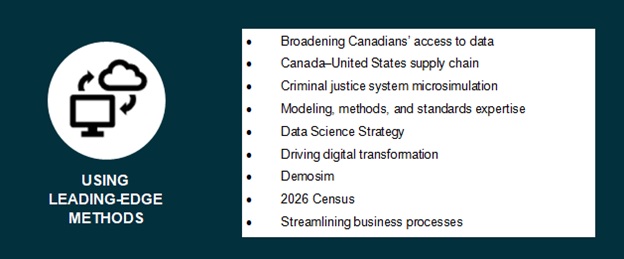
Description - Modernization principle: Using leading-edge methods
Using leading-edge methods
- Broadening Canadians' access to data
- Canada–United States supply chain
- Criminal justice system microsimulation
- Modeling, methods, and standards expertise
- Data Science Strategy
- Driving digital transformation
- Demosim
- 2026 Census
- Streamlining business processes
Broadening Canadians' access to data
The following initiatives will ensure that academic researchers and partner government organizations are well positioned to draw insights from Statistics Canada's data:
- The Virtual Data Lab (VDL) environment, which provides seamless and flexible access from authorized workspaces, will be expanded. Through targeted outreach, the agency will expand access and diversify data availability. There are also plans to include the 2021 agriculture and population database in the VDL.
- The Virtual Research Data Centre environment will provide high-performance computing for academic research and facilitate access from smaller academic institutions located in remote regions. In collaboration with the Canadian Research Data Centres Network, the agency will improve and expand access for academic researchers. Business data will also be included more broadly.
- The agency will increase the use of various aggregate and microdata products by ensuring that public use microdata files and confidential microdata files are made available through all access solutions, are representative of all Statistics Canada subject-matter areas and align with the interests of data users.
Canada–United States supply chain
Statistics Canada and the U.S. Bureau of Economic Analysis initiated a collaborative effort to develop a set of joint Canada–U.S. supply and use tables, building on national supply and use data currently produced by each statistical agency. The resulting integrated dataset will facilitate macroeconomic modelling and the analysis of pre- and post-pandemic global value chain linkages between Canada and the United States, including the eventual development of bilateral trade in value added statistics.
Criminal justice system microsimulation
Within the scope of the Justice Data Modernization initiative, Statistics Canada will collaborate with the Department of Justice Canada to build a simulation model of criminal justice system pathways. The purpose of the model is to project the impacts of hypothetical justice and social sector interventions (such as improvements in education and housing) on reducing contact with the justice system and, in particular, reducing the overrepresentation of Indigenous and racialized groups. This work will help determine the most effective types of interventions in preventing crime and reducing the costs of the criminal justice system.
Modelling, methods and standards expertise
Statistics Canada will strengthen its horizontal research and modelling capacity to provide Canadians with integrated, timely and comprehensive insights, including on the impacts of COVID-19 and post-pandemic economic growth and recovery.
Through horizontal collaboration between internal and external experts, the agency will continue to establish the statistical infrastructure, systems and methods that can respond to the real-time and disaggregated data needs of Canadians, while maintaining the statistical and analytical rigour that partners expect of their national statistical office. The agency will foster a culture of quality based on established open standards and leading-edge methods, in adherence with world-class values of statistical quality and rigour.
Statistics Canada will also support the development of standards, data acquisition, data integration, training and data strategies that enable the development of disaggregated data products. This will include providing leadership in various committees and internal working groups to position projects for success.
The agency will build on its long-standing expertise in modelling to advance the development and use of advanced techniques and will support their use by policy makers to inform critical social and economic issues.
Data Science Strategy
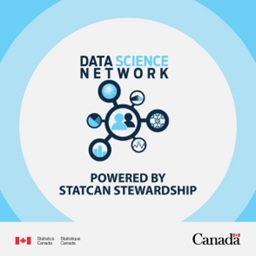
As part of Statistics Canada's Data Science Strategy, the agency will
- develop novel proofs of concept and deploy machine learning and automation to address business problems
- integrate open-source and cloud-based tools in support of program areas, establishing efficient data ingestion practices
- create a variety of specialized recruitment and training initiatives
- advance the adoption of responsible data science by sharing knowledge and engaging the federal public service community through the Data Science Network for the Federal Public Service.
For example, the AgZero initiative will continue to use alternative methods, such as data science, satellite images and administrative data, to produce high-quality agricultural statistics to reduce the burden imposed by collecting information directly from farmers.
The agency is exploring the use of low-resolution Earth observation images by developing and adopting leading-edge enhancement technology to reduce data acquisition costs, enabling the replacement of field collection when measuring construction starts.
Work will continue on developing and deploying machine learning tools to enhance the accuracy of automated classification and support faster integration of new data sources, including scanner data and web-scraped data. Additionally, the agency will research new methods for active learning frameworks and create training data for new retailers in a cost-effective way by creating an efficient feedback loop for improving classifiers over time.
Driving digital transformation
Statistics Canada will implement the Government of Canada's digital ambitions across the agency, in adherence with the Policy on Service and Digital, Directive on Service and Digital, Guideline on Service and Digital, and Government of Canada Digital Standards. The agency will also ensure alignment with the Government of Canada's enterprise architecture principles and strategic opportunities presented by emerging technologies to drive digital transformation.
Key activities planned for 2023–24 will allow a greater alignment with the Policy on Service and Digital. A review of the target-state enterprise architecture and the departmental architecture review board will be undertaken to ensure alignment with the current business context and agency needs. Statistics Canada will collaborate with internal and external stakeholders to identify emerging technologies that have the potential to be transformational for the agency through research and proof-of-concept activities.
The agency will continue to leverage its new cloud environment for digital transformation and its newly built Data Analytics as a Service platform to support the use of modern statistical methods and enable collaboration with partners.
The agency will ensure that its digital solutions remain viable and secure, while measuring business value and effectiveness, to ensure that its products are providing good value to Canadians.
Population projections
Demosim is a microsimulation model developed and maintained at Statistics Canada that is designed to produce population projections. The agency will complete the rebasing of the model with the 2021 Census to add relevant new content, including gender and children eligible to receive instruction in the minority official language. This rebasing will allow Demosim to keep contributing to labour market availability targets for the Employment Equity Act.
Preparing for the 2026 Census
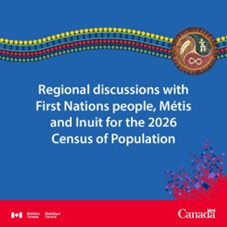
Planning for the 2026 Census is underway. The agency is leveraging the success of the 2021 Census while adapting to accelerating societal and technological changes to ensure that high-quality, relevant data are produced in a cost-effective, environmentally friendly way that builds and maintains trust with Canadians.
Statistics Canada will conduct extensive consultations with data users, stakeholders and the general public across Canada, allowing them to share their views on both the content and the dissemination strategy of the census. In addition, the agency will conduct field testing of the Census of Agriculture questionnaire content with a sample of farm operations in 2023–24.
Streamlining business processes
The Global Environment for the Economic Statistics Ecosystem project involves developing a new platform for economic statistics programs within the agency. It will include a full overhaul of the way work is carried out and the tools used to do it. The aim is to eliminate repetitive processes, allow for more time devoted to analysis, respond to new demands as required without impacting regular production, and enable resources to move freely between different sections in a common infrastructure.
In 2023–24, this project will
- partner with the Enterprise Information and Data Management project to increase and promote the use of statistical standards in the compilation of official statistics; this work will be done by leveraging the international Statistical Data and Metadata eXchange initiative, which aims to standardize and modernize the mechanisms and processes for exchanging data, and the result will be a standardized and searchable data catalogue, useable by data consumers within and outside Statistics Canada
- collaborate with other national statistical offices and international statistical organizations to modernize the digital ecosystem used to compile the Canadian System of Macroeconomic Accounts (CSMA); this international collaboration focuses on sharing best practices for open-source development, sharing project plans and lessons learned, and working toward sharing methods and functions built in open-source software for international comparability and interoperability of national accounting
- develop a new cloud-based environment for the production of the CSMA; the vision for this project is for all CSMA data to be produced in an environment that is flexible, reliable, traceable, reusable, integrated through metadata-driven systems, directly accessible and with code editable by analysts, and designed to incorporate future developments as new tools and technologies become available.
Modernization principle: Having a modern workforce and workplace
Statistics Canada's most precious asset is its people. A modern workforce and workplace means providing employees with access to the services and modern work environment that enable them to deliver results, mitigate organizational challenges and pursue business opportunities.
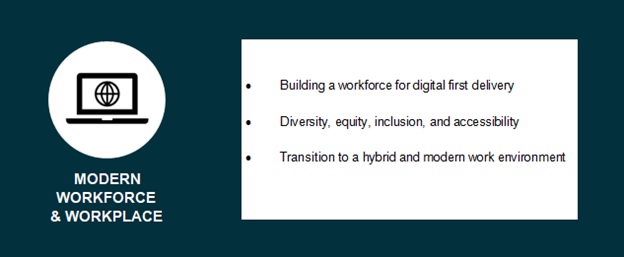
Description - Modernization principle: Having a modern workforce and workplace
Having modern workforce and workplace
- Building a workforce for digital first delivery
- Diversity, equity, inclusion, and accessibility
- Transition to a hybrid and modern work environment
Building a workforce for digital-first delivery
In 2023–24, the agency will focus on implementing digital talent and leadership strategies to build a workforce for digital-first delivery. Statistics Canada's digital program will evolve through the lens of the user experience and will focus on enabling the agency's hybrid workplace environment, digitalizing the onboarding process for new employees, and increasing the availability of accessible tools and technologies.
Diversity, equity, inclusion and accessibility
Statistics Canada is committed to supporting equity-seeking employees and providing opportunities for the development, visibility and career advancement of diverse talent while fostering a tradition of inclusion, awareness and belonging.
The agency will continue to encourage a culture of accountability, where everyone understands their responsibilities in achieving a diverse workforce and an inclusive workplace. The agency will continue to prioritize diversity in language training programs and will introduce a multi-pronged sponsorship program that supports diverse talent and informs succession planning up to and including the executive level. It will focus specifically on advancing the careers of Black and Indigenous employees and employees with disabilities.
The agency will also implement its first multi-year accessibility plan, Statistics Canada: Road to Accessibility, which aims to establish a barrier-free Statistics Canada by articulating commitments across a range of areas of focus, including culture, employment practices, the physical built environment, accommodation policies and practices, communications, information technologies, programs and services, and procurement, to enable the full participation of all employees.
Transition to a hybrid and modern work environment
After more than two years in which employees primarily worked remotely and successfully delivered critical data to Canadians and policy makers to inform complex decisions during the pandemic, Statistics Canada recognizes the need to move forward collectively and shift to a post-pandemic world. The agency is implementing a sustained hybrid model, while pursuing a multi-year plan to modernize its office spaces. These actions align with the common hybrid work model for the Federal Public Service and agency-wide human resources strategies, such as adopting a national hiring strategy, increasing diversity and inclusion, and creating an environment that attracts and retains talent.

The approach taken balances the value demonstrated by empowering and trusting employees with the flexibility to work remotely, while ensuring a sustained onsite presence to maximize results for activities that are inherently more effective in a face-to-face environment. Statistics Canada is committed to both virtual and onsite work as complementary to one another and has adopted a truly hybrid model. Tools such as space booking systems and team charters have been developed to support employees with the transition to hybrid work.
Modernization principle: Building numeracy and data literacy skills
As Canada's national statistical organization, the agency is committed to sharing its knowledge and expertise to support statistical capacity building, build numeracy and literacy, and help Canadians use data as a strategic asset to improve decision making and outcomes.
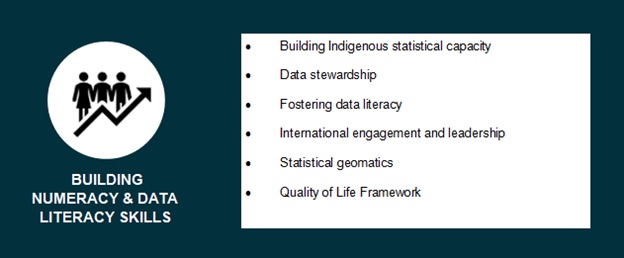
Description - Modernization principle: Building numeracy and data literacy skills
Building numeracy and data literacy skills
- Building Indigenous statistical capacity
- Data stewardship
- Fostering data literacy
- International engagement and leadership
- Statistical geomatics
- Quality of Life Framework
Building Indigenous statistical capacity
Statistics Canada will continue to be an important resource that respects self-government and provides support for Indigenous data capacity, while improving the visibility of Indigenous peoples in Canada's national statistics through its partnership with Indigenous Services Canada.
This includes
- working with Indigenous partners to develop distinctions-based work plans that prioritize data and research projects that are pertinent to their needs
- supporting Indigenous organizations and communities in developing and sustaining their own statistical capacity by offering various training courses through the expanded Indigenous Statistical Capacity Development Initiative
- focusing efforts on targeted research products related to key priorities and new Indigenous-specific data collected to populate priority national indicators and improve data disaggregation for First Nations people, Métis and Inuit.
Data stewardship
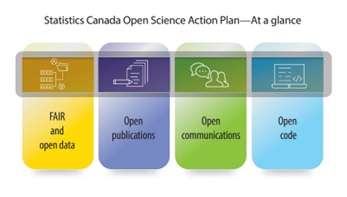
Statistics Canada will provide leadership, expertise and support functions to establish a renewed roadmap for the Government of Canada data strategy and will continue to develop data governance standards in collaboration with the Standards Council of Canada (SCC). In particular, the agency will advance work on data standards through this collaboration and initiatives of interest, such as environmental, social and governance frameworks and digital identity work, including participation in the SCC's National Standards Advisory Committee for the National Standards Strategy. Statistics Canada will also continue to make progress on elements of the Open Science Action Plan and promote open data.
Fostering data literacy
The agency will continue to show leadership on data literacy by further developing the Data Literacy Training Initiative and providing online accessibility training products to support the data literacy journey of its many partners, and Canadians more broadly, as they seek to improve their competencies.
International engagement and leadership
Statistics Canada will play a significant role in the international statistical system through its involvement in over 150 international technical groups, of which it chairs or co-chairs approximately 25. In addition to these groups, Statistics Canada will continue to hold influential positions, such as
- chair of the High-level Group for the Modernisation of Official Statistics
- co-chair of the Inter-agency and Expert Group on Sustainable Development Goal Indicators
- co-chair of the United Nations' Network of Economic Statisticians
- member of the Organisation for Economic Co-operation and Development's Committee on Statistics and Statistical Policy
- member of the Conference of European Statisticians of the United Nations Economic Commission for Europe (UNECE)
- member of the UNECE Blue Skies Thinking Network
- local organizer of the International Statistical Institute's 64th biennial World Statistics Congress, to be held in Ottawa in 2023.
Statistics Canada's Project for the Regional Advancement of Statistics in the Caribbean will conclude in 2023–24, after eight years of helping Caribbean countries improve their statistical systems. During this time, the agency will have provided training and support to enable Caribbean national statistical offices to build, maintain and improve their national systems, as well as support in creating and enhancing their websites and dissemination mechanisms.
Statistical geomatics
Statistics Canada is implementing its statistical geomatics vision with a whole-of-agency approach to maximize value for Canadians, while following internationally recognized foundational principles. This will enable the integration and use of additional geospatial information and geolocated statistics through interoperable solutions, common geographies and standards, while taking into account ethics, privacy and confidentiality concerns. This initiative will support the production of additional geolocated statistical insights on the environment, society and the economy.
Quality of Life Framework
Statistics Canada will further develop the Quality of Life Framework for Canada and the Quality of Life Statistics Program in conjunction with key partners, such as the Treasury Board of Canada Secretariat, the Department of Finance Canada and the Privy Council Office. The agency will continue to support interdepartmental governance for the Quality of Life Statistics Program, actively engage with other federal departments and agencies to align efforts, and ensure that the program continues to support the integration of quality of life measurements into budgeting and decision making.
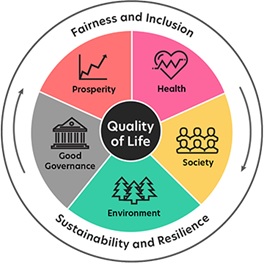
Statistics Canada will also continue to consult broadly with federal partners to ensure that quality of life indicator definitions are fully developed and kept relevant over time. The agency will collaborate with internal and external partners to fill data gaps and expand current data holdings, and ensure that disaggregated quality of life statistics are available for the Canadian population. Statistics Canada will continue to develop the Quality of Life Hub by adding functionality to enhance the user experience and to manage and integrate data efficiently, making well-being statistics easily accessible and interpretable for all Canadians.
Gender-based Analysis Plus
Gender-based Analysis Plus (GBA Plus) fuels Statistics Canada's organizational decision making. The agency supports other government departments with respect to GBA Plus and relevant initiatives and ensures that its work is beneficial to the public—in all of its diversity—by disseminating data disaggregated by sex, gender and other intersecting identity factors, as well as gender-based and intersectional analyses. Statistics Canada provides statistical leadership and analytical expertise for the development of progress metrics and relevant statistical standards. It is also building GBA Plus knowledge and capacity, and monitoring and addressing emerging data needs.
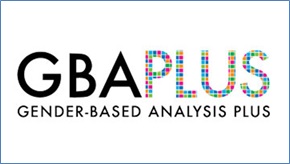
In 2023–24, Statistics Canada will continue to report to Canadians about the state and progress of gender, diversity and inclusion in Canada. This includes updating the Gender Results Framework indicators and improving the Sex, Gender and Sexual Orientation Statistics Hub. Through the release of new analytical products, the agency will generate new information to increase knowledge and will develop new concepts and measures to address intersecting identity characteristics, including the release of a new statistical standard on sexual orientation. Further, Statistics Canada will build awareness, knowledge and capacity relevant to gender, diversity and inclusion in Canada and GBA Plus, notably through the GBA Plus Responsibility Network and the GBA Plus Community of Practice.
United Nations 2030 Agenda for Sustainable Development and the Sustainable Development Goals
Statistics Canada will continue to play a key role in implementing the 2030 Agenda for Sustainable Development and the Sustainable Development Goals (SDGs). Internationally, the agency is a senior member and co-chair of the Inter-agency and Expert Group on SDG Indicators (IAEG-SDGs). Beginning in late 2023 and continuing into 2024, the IAEG-SDGs will begin the revision process of the Global Indicator Framework for SDGs. This will include examining the existing 232 global indicators and undertaking a global consultation to determine whether any changes should be made to the framework.
Statistics Canada will also continue to be a member of the United Nations Economic Commission for Europe (UNECE) Steering Group on Statistics for SDGs. In 2023–24, this group will continue to help UNECE countries implement the SDGs through various capacity development initiatives, expert meetings and webinars; share best practices and open-source tools; and help SDG experts in national statistical offices build relationships with policy makers to ensure that high-quality official statistics are used in the development of policies designed to achieve the SDGs.
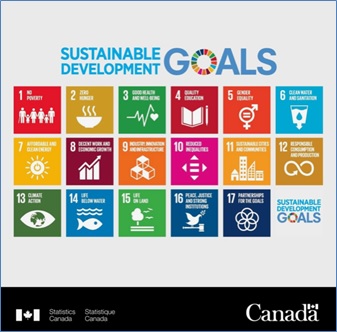
Statistics Canada will also continue to report on the Global Indicator Framework for Canada and migrate the agency's global indicator data hub to the Open SDG platform, which will provide users with an interactive experience to view Canada's reporting on the global indicators.
Domestically, Statistics Canada will continue to report on the Canadian Indicator Framework (CIF) for SDGs through the CIF data hub. In 2023, the agency will begin a review of the CIF to determine whether changes to the indicators are necessary. This includes a government-wide consultation.
Innovation
Statistics Canada will continue to strengthen its innovation ecosystem with investment, governance, infrastructure and skills development to promote innovation and experimentation. This will accelerate the response to both agency-wide and Government of Canada priorities.
In 2023–24, the agency will continue to implement a modern data analytics open-source ecosystem, supporting the agency's network of grassroots communities of practice, advancing the Lean culture transformation strategy and supporting program areas in their use of experimentation approaches.
The agency will continue to engage internal and external partners by hosting monthly hackathon series, encouraging design thinking and co-creation activities, and realizing the goals of the 2022–-23 Public Service Data Challenge.
Other planned innovations include
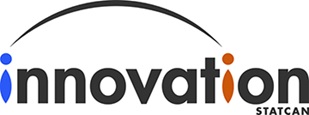
- developing experimental indexes to help policy makers better understand the inflation pass-through effect from the business to the consumer sector and to inform work on rent affordability
- developing production-ready harmonized indicators that better leverage administrative data, and continuing to experiment with variable replacement to see how it can be used to reduce response burden
- developing capacity in life-course analysis using survey and administrative data through the Longitudinal Social Data Development Program, and mapping population trajectories regarding the differential impacts of the COVID-19 pandemic on different populations
- modernizing tools for the production of population projections.
Key risks
By continuously monitoring its internal and external environment, Statistics Canada addresses uncertainties related to its core responsibilities. The agency adopted an integrated risk management process to identify, assess and prioritize risks and respond to them. This approach guides the agency's business planning to ensure the timeliness, reliability and quality of its statistics. The agency has identified, assessed and ranked the following five corporate risks and developed corresponding strategies to mitigate each risk.
Public trust
Risk: Statistics Canada may not be perceived as a trusted national statistical office.
Mitigation strategy: Communicate with Canadians to build awareness and promote public trust.
Privacy and confidentiality
Risk: Statistics Canada may experience a privacy breach or wrongful disclosure of information.
Mitigation strategy: Ensure that controls and safeguards are in place to manage and protect the vast amount of confidential and sensitive information, strengthen the agency's data ethics and governance processes, and regularly assess the agency's information security and information technology posture.
Relevance
Risk: Statistics Canada's statistical information and services may not meet the evolving needs and expectations of users.
Mitigation strategy: Continue to modernize internal operations to address the evolving data needs of external stakeholders.
Resources
Risk: Statistics Canada may not have the resources that it requires to deliver its mandate.
Mitigation strategy: Develop strategies to ensure long-term financial stability; ensure staffing and talent-management practices are in place, as well as Recruitment and Development Programs that are reflective of the agency's needs.
Accuracy
Risk: Statistics Canada may not be able to acquire high-quality data or release accurate statistics.
Mitigation strategy: Strengthen instruments for validating methods and processes, ensure management practices are integrated into processes, and investigate published errors to identify and address deficiencies.
Planned results for Statistical Information
The following table shows, for Statistical Information, the planned results, the result indicators, the targets and the target dates for 2023–24, and the actual results for the three most recent fiscal years for which actual results are available.
| Departmental result | Departmental result indicator | Target | Date to achieve target | 2019–20 actual result | 2020–21 actual result | 2021–22 actual result |
|---|---|---|---|---|---|---|
| High-quality statistical information is available to Canadians | Number of post-release corrections due to accuracy for mission critical programsTablenote 1 | 0 | March 31, 2024 | 1 | 19 | 7 |
| Percentage of international standards with which Statistics Canada conforms | 90%Tablenote 2 | March 31, 2024 | 88% | 88% | 88% | |
| Number of statistical products available on the website | 48,000 | March 31, 2024 | 37,254 | 40,738 | 43,184 | |
| Number of Statistics Canada data tables available on the Open Data Portal | 8,790 | March 31, 2024 | 7,386 | 7,755 | 8,088 | |
| High-quality statistical information is accessed by Canadians | Number of visits to Statistics Canada website | 22,500,000Tablenote 3 | March 31, 2024 | 20,285,269 | 28,193,955Tablenote 4 | 45,972,326Tablenote 5,Tablenote 6 |
| Number of hits on Statistics Canada's Application Programming Interface (API) | 6,001,400 | March 31, 2024 | Not available | 3,899,779 | 5,950,252 | |
| Percentage of website visitors that found what they were looking forTablenote 7 | 78% | March 31, 2024 | Not available | Not available | Not available | |
| Number of interactions on social media | 500,000Tablenote 3 | March 31, 2024 | 521,441 | 1,211,316Tablenote 4 | 13,174,481Tablenote 5,Tablenote 6 | |
| High-quality statistical information is relevant to Canadians | Number of media citations on Statistics Canada data | 82,000Tablenote 3 | March 31, 2024 | 56,921 | 253,171Tablenote 4 | 139,078Tablenote 6 |
| Number of journal citations | 38,000 | March 31, 2024 | 26,505 | 33,596Tablenote 4 | 40,248Tablenote 8 | |
| Percentage of users satisfied with statistical informationTablenote 9 | 80% | March 31, 2024 | Not available | Not available | Not available | |
|
||||||
The financial, human resources and performance information for Statistics Canada's program inventory is available on GC InfoBase.
Planned budgetary spending for Statistical Information
The following table shows, for Statistical information, budgetary spending for 2023–24, as well as planned spending for that year and for each of the next two fiscal years.
| 2023–24 budgetary spending (as indicated in Main Estimates) | 2023–24 planned spending | 2024–25 planned spending | 2025–26 planned spending | |
|---|---|---|---|---|
| Gross planned expenditures | 579,311,471 | 579,311,471 | 571,978,435 | 571,251,486 |
| Respendable revenue | -120,000,000 | -120,000,000 | -120,000,000 | -120,000,000 |
| Net planned expenditures | 459,311,471 | 459,311,471 | 451,978,435 | 451,251,486 |
Financial, human resources and performance information for Statistics Canada's program inventory is available on GC InfoBase.
Planned human resources for Statistical Information
The following table shows, in full-time equivalents, the human resources the department will need to fulfill this core responsibility for 2023–24 and for each of the next two fiscal years.
| 2023–24 planned full-time equivalents | 2024–25 planned full-time equivalents | 2025–26 planned full-time equivalents | |
|---|---|---|---|
| Gross planned expenditures | 5,415 | 5,389 | 5,367 |
| Respendable revenue | -1,189 | -1,189 | -1,189 |
| Net planned expenditures | 4,226 | 4,200 | 4,178 |
Overall, Statistics Canada is expecting to maintain its capacity for the delivery of ongoing statistical programs in future years, with no significant shifts in resources. The decrease in planned resources from 2023–24 to future years reported above relates largely to the cyclical nature of the Census Program, as funding for the 2021 Census of Population and Census of Agriculture winds down. Funding for the 2026 Census of Population and Census of Agriculture has not yet been approved but is expected to be approved in 2023–24, which would be the first year of funding.
Also reflected in all three years are planned resources for several initiatives from Budget 2021, as well as new initiatives from Budget 2022. These new initiatives include Taking More Action to Eliminate Plastic Waste, Building a World-Class Intellectual Property Regime and Dental Care for Canadians.
Financial, human resources and performance information for Statistics Canada's program inventory is available on GC InfoBase.